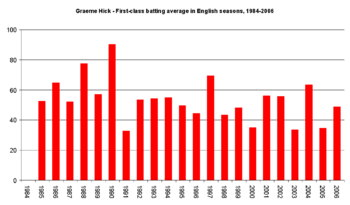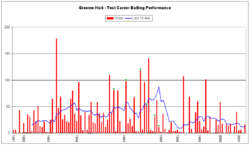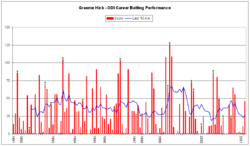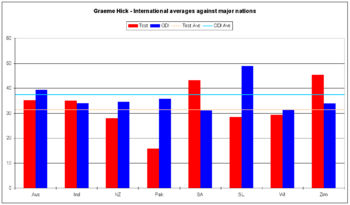Graeme Hick facts for kids
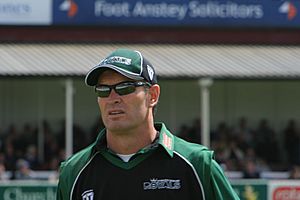 |
||||||||||||||||||||||||||||||||||||||||||||||||||||||||||||||||||
| Personal information | ||||||||||||||||||||||||||||||||||||||||||||||||||||||||||||||||||
|---|---|---|---|---|---|---|---|---|---|---|---|---|---|---|---|---|---|---|---|---|---|---|---|---|---|---|---|---|---|---|---|---|---|---|---|---|---|---|---|---|---|---|---|---|---|---|---|---|---|---|---|---|---|---|---|---|---|---|---|---|---|---|---|---|---|---|
| Full name |
Graeme Ashley Hick
|
|||||||||||||||||||||||||||||||||||||||||||||||||||||||||||||||||
| Born | 23 May 1966 Salisbury, Rhodesia |
|||||||||||||||||||||||||||||||||||||||||||||||||||||||||||||||||
| Nickname | Hicky, Ash | |||||||||||||||||||||||||||||||||||||||||||||||||||||||||||||||||
| Height | 6 ft 3 in (1.91 m) | |||||||||||||||||||||||||||||||||||||||||||||||||||||||||||||||||
| Batting | Right-handed | |||||||||||||||||||||||||||||||||||||||||||||||||||||||||||||||||
| Bowling | Right-arm off break | |||||||||||||||||||||||||||||||||||||||||||||||||||||||||||||||||
| Role | Batsman | |||||||||||||||||||||||||||||||||||||||||||||||||||||||||||||||||
| International information | ||||||||||||||||||||||||||||||||||||||||||||||||||||||||||||||||||
| National sides |
|
|||||||||||||||||||||||||||||||||||||||||||||||||||||||||||||||||
| Test debut (cap 548) | 6 June 1991 England v West Indies |
|||||||||||||||||||||||||||||||||||||||||||||||||||||||||||||||||
| Last Test | 7 March 2001 England v Sri Lanka |
|||||||||||||||||||||||||||||||||||||||||||||||||||||||||||||||||
| ODI debut (cap 112) | 23 May 1991 England v West Indies |
|||||||||||||||||||||||||||||||||||||||||||||||||||||||||||||||||
| Last ODI | 27 March 2001 England v Sri Lanka |
|||||||||||||||||||||||||||||||||||||||||||||||||||||||||||||||||
| Domestic team information | ||||||||||||||||||||||||||||||||||||||||||||||||||||||||||||||||||
| Years | Team | |||||||||||||||||||||||||||||||||||||||||||||||||||||||||||||||||
| 1984–2008 | Worcestershire | |||||||||||||||||||||||||||||||||||||||||||||||||||||||||||||||||
| 1987/88–1988/89 | Northern Districts | |||||||||||||||||||||||||||||||||||||||||||||||||||||||||||||||||
| 1988–1991 | MCC | |||||||||||||||||||||||||||||||||||||||||||||||||||||||||||||||||
| 1990/91 | Queensland | |||||||||||||||||||||||||||||||||||||||||||||||||||||||||||||||||
| 1997/98 | Auckland | |||||||||||||||||||||||||||||||||||||||||||||||||||||||||||||||||
| Career statistics | ||||||||||||||||||||||||||||||||||||||||||||||||||||||||||||||||||
|
||||||||||||||||||||||||||||||||||||||||||||||||||||||||||||||||||
|
Medal record
|
||||||||||||||||||||||||||||||||||||||||||||||||||||||||||||||||||
|
Source: CricInfo, 14 September 2016
|
||||||||||||||||||||||||||||||||||||||||||||||||||||||||||||||||||
Graeme Ashley Hick (born 23 May 1966) is a former cricket player from Zimbabwe and England. He played in 65 Test matches and 120 One Day International (ODI) games for the England cricket team. Graeme was born in Rhodesia (now Zimbabwe). As a young player, he even represented Zimbabwe in international cricket.
He spent his entire English club career playing for Worcestershire. This was for more than twenty years! In 2008, he broke Graham Gooch's record for playing the most matches across all types of cricket. Graeme was also part of the England team that finished second in the 1992 Cricket World Cup.
Graeme Hick scored over 40,000 first-class runs. He is one of only three players to score more than 20,000 runs in List A cricket. The other two are Graham Gooch and Sachin Tendulkar. He is also one of only 25 players to have scored 100 centuries (100 runs in one innings) in first-class cricket. He is the only player to score triple centuries (300 runs) in three different decades. These were in 1988, 1997, and 2002.
Graeme is the second-highest run-scorer in first-class cricket, after Graham Gooch. He is also second in scoring the most centuries, after Jack Hobbs. Even with these amazing achievements, some people felt he could have done even better in international matches. This is because his overall first-class batting average was 52.23, but his Test average was 31.32.
Graeme Hick was also a good bowler, taking over 200 first-class wickets with his off-spin bowling. However, after 2001, he rarely bowled. He was also an excellent slip fielder, catching many balls.
Worcestershire held a special event for him in 1999, which raised over £345,000. He also received a special award in 2006. Graeme retired from county cricket at the end of the 2008 season. He then became a coach at Malvern College. For a short time, he also played for the Chandigarh Lions in the Indian Cricket League.
Contents
Early Life and Cricket Beginnings
Graeme Hick was born in Salisbury, Rhodesia (now Harare, Zimbabwe). His family were tobacco farmers. At first, he was more interested in hockey than cricket. He even played for the national schools hockey team. He was also more of a bowler than a batsman.
Becoming a Top Batsman
In 1979, Graeme started scoring many runs regularly. He averaged 185 for his school team. In 1980, he had a mild illness, but he still became captain of the national Junior Schools team. Soon after, he played for the Senior Schools team. He went to Prince Edward School.
When he was just 16, Graeme played three minor one-day games for Zimbabwe Colts and Zimbabwe Country Districts. This was against Young Australia in 1982–83. He didn't score many runs in these games. However, he did bowl out Dean Jones in one match.
World Cup Debut and First-Class Cricket
Graeme was chosen for the Zimbabwean squad for the 1983 Cricket World Cup. He was the youngest player ever to be picked for a World Cup squad. But he didn't get to play in the tournament.
On 7 October 1983, Graeme made his first-class debut for Zimbabwe. This was against Young West Indies in Harare. He scored 28 runs not out, helping his team win. Eight days later, he played his first List A game. He scored 16 not out in that match.
On 7 December 1983, Graeme took his first first-class wicket. He bowled out Sri Lanka Test batsman Susil Fernando. Four days later, he scored his first first-class fifty, making 57 runs. In March 1984, he scored 62 not out in a one-day match. He was named Man of the Match for this performance. Steve Waugh later said that at 18, Graeme was as good as any player of that age in cricket history.
Playing for Worcestershire
In 1984, Graeme Hick came to England on a scholarship. He played very well for Worcestershire's Second XI team. He took five wickets in an innings twice. He also scored 195, 170, and 186 runs in a short time. This led to his first-team debut against Surrey in the last match of the 1984 County Championship. He scored 82 not out in his first innings. He also played for Kidderminster and scored 1,234 runs, a club record.
Early Success in England
Graeme spent the winter playing for Zimbabwe. His highest scores were 95 and 88 against Young New Zealand. His good year in 1984 made him want to keep playing in England. In 1985, Zimbabwe toured England, and Graeme played for both his country and his county. He had a great season, averaging 52.70 runs. He scored his first century, 230 runs, for Zimbabweans against Oxford University. This was the first of six years in a row where he averaged over fifty in first-class cricket in England.
That winter, playing in Zimbabwe, he scored 309 runs in a minor match against Ireland. This was the highest score ever for Zimbabwe or Rhodesia. The 1986 English season was the first time Graeme did very well in one-day games. He scored 889 List A runs, averaging over forty. In 1986, at 20 years old, he became the youngest player to score 2,000 first-class runs in a season.
Awards and Records
In 1987, Graeme was named one of Wisden's five Cricketers of the Year. He also had a very successful one-day season. Worcestershire won the Refuge Assurance League. He scored over 1,000 List A runs that year, averaging over seventy. He made his best one-day score of 172 not out against Devon. By this time, his first-class average was over sixty. People were very excited about his batting skills.
In 1988, Graeme helped his county win their first County Championship title since 1974. He became the first player since Glenn Turner to score 1,000 first-class runs before the end of May. He scored 410 of those runs in April alone, a record for that month. In early May, he made his highest first-class score, 405 not out against Somerset. He scored 1,019 runs before the end of May. That season, he scored a career-best total of 2,713 runs. This included ten first-class hundreds, matching a Worcestershire record. He also won an award for the fastest century of the season. He was named Player of the Year by the Professional Cricketers' Association.
Playing Overseas and Captaincy
In 1987–88 and 1988–89, Graeme spent his winters playing in New Zealand for Northern Districts. He was very successful, scoring ten centuries. He averaged 63.61 in the first season and 94.46 in the second. Back in England, in 1989 and 1990, Graeme continued to score many runs. He scored over 4,000 first-class runs in these two years. He averaged 90.46 in 1990, his highest average in an English summer. He then played for Queensland in Australia. By March 1991, people were looking forward to him playing for England.
Graeme became captain of Worcestershire for three seasons (2000 to 2002). He enjoyed being captain. He was "surprised and disappointed" when he was replaced in 2003. His personal performance was good during his captaincy. He scored 200 not out at Durham. This meant he had scored first-class hundreds against all 17 other counties. In June 2001, he scored 155 runs, his highest List A score in 14 years.
Later County Career
Graeme had some injuries around this time. He missed the end of the 2002 season with a broken thumb. In 2003, he broke his hand and couldn't play for six weeks. His average dropped to 33.50 that season. However, in 2004, he returned to form. He scored 1,589 first-class runs, his best since 1990. He was picked for the FICA World XI team in 2005.
The 2005 season was mixed for him. But 2006 was much better. He scored his hundredth century for Worcestershire. He was only the second player since World War II to do this for a single county. He also helped Worcestershire get promoted in the last game of the season. He signed a one-year contract extension. He said his "heart has always been with Worcestershire."
In April 2007, Graeme said he didn't want to retire. He felt he was still fit and enjoyed playing. In June, he became the 16th player to score 40,000 first-class runs. He signed another contract extension for the 2008 season. In 2008, he became the first player to play in over 1200 games. He also achieved 1000 catches in his career. He retired at the end of the 2008 season to coach at Malvern College.
International Career with England
Starting with England
By 1986, people were seriously thinking about Graeme playing Test cricket. The question was which country he would play for. Zimbabwe was not yet a Test-playing nation. So, he decided to wait seven years to qualify to play for England. When he became eligible, there was huge excitement about him playing for England. David Lloyd later said that no player had ever faced such high expectations.
Graeme played his first games for England in a three-match One Day International series against West Indies. His first match was on 23 May 1991. He scored only 14 runs in that game. But a few days later, he scored 86 not out and helped England win. This set the stage for his Test debut on 6 June. He was even on the cover of the Radio Times.
He received a big welcome from the crowd. But he only scored six runs in his first Test innings. He didn't do much better in later innings and was dropped from the team. He had a tough first season for England.
World Cup and First Test Century
The 1992 Cricket World Cup followed, and Graeme enjoyed it much more. England reached the final, thanks to his three half-centuries. His most important score was 83 in the semi-final against South Africa. This helped England win. He scored 17 in the final.
In 1992, Graeme finally scored a Test half-century, 51 against Pakistan. But he was dropped again. However, he scored many runs for Worcestershire. This good form, and his skill against spin bowling, earned him a spot on the 1992–93 tour of India. England had a difficult tour, but Graeme was one of the few bright spots. He scored his first Test century, 178 runs, in the third Test in Bombay. He then scored 68 and 26 against Sri Lanka. For his efforts, he was named one of Indian Cricket's Cricketers of the Year in 1993.
Successful Years in Tests
The India tour marked the start of Graeme's most successful period in Test cricket. His average improved greatly over the next three years. In 1993, he scored 85 in an ODI. In an Ashes Test, he was famously teased by Merv Hughes. The umpire, Dickie Bird, even asked Hughes why he was teasing "that nice Mr Hick." Hughes later said he only teased batsmen he respected.
Graeme was dropped again after the second Ashes Test, which surprised Shane Warne. He was recalled for the sixth Test and scored 80 and 36. He had a good tour of the West Indies, scoring 96 runs in one Test. In 1994, he played in all six Tests against New Zealand and South Africa. He averaged over sixty against South Africa, scoring 110 in one Test and a match-winning 81 not out in another. He also helped Worcestershire win the 1994 NatWest Trophy.
The Ashes and Injuries
The 1994–95 Ashes series had a famous moment. England captain Mike Atherton declared the innings when Graeme was 98 not out. Atherton felt Graeme was scoring too slowly. Graeme was surprised and hurt not to reach his century. His teammates "couldn't believe" the decision. Atherton later said he wouldn't make that decision again.
Graeme seemed to get over it quickly. He scored a match-winning 91 in an ODI. This put him second in the world rankings. But a slipped disc ended his tour before the fourth Test. He never got so close to an Ashes century again.
Continued Strong Performances
West Indies visited in 1995. Graeme had a good summer, averaging over 50 in Tests. Highlights included 118 not out and scores of 96 and 51 not out. He also averaged over 50 in the County Championship. He took a career-best 5 wickets for 18 runs against Leicestershire. In the Benson & Hedges Cup, he scored three hundreds.
The next winter's tour was to South Africa. Graeme scored a superb hundred on the first day of the first Test. Allan Donald said he "hammered us." He scored 141 before being out. He played in all five Tests and seven ODIs on that tour. The 1996 Cricket World Cup followed, where he scored 85 against New Zealand.
Challenges and Comebacks
In 1996, Graeme's form dropped. He scored only 35 runs in four innings against India. He was dropped from both Test and ODI teams for a year and a half. Back at Worcestershire, he scored 148 and 86 against Kent. But then he had a tough period without scoring much.
For the first time, Graeme was not picked for the winter tours. This was hard because it included Tests in Zimbabwe. He did play in Zimbabwe, but only for Worcestershire. In 1997, he had no international duties. He averaged 69, scoring over 1,500 first-class runs. A highlight was an unbeaten 303 against Hampshire. He shared a record 438-run partnership with Tom Moody.
Graeme was recalled for ODI series in December 1997 and April 1998. He played in nine games but never reached fifty. He started the 1998 season slowly but then scored four hundreds in a row in first-class games. He was selected for the final two Tests against South Africa. He scored only nine runs in three innings. But after two half-centuries in ODIs and 107 in a Test against Sri Lanka, he seemed to have done enough. However, John Crawley's 156 outshone his century, and Crawley was picked for the Ashes tour.
Graeme received an emergency call-up for the Ashes tour because Mike Atherton had a back problem. Graeme played in four Tests but had a poor series, averaging 25. However, his 68 in Perth and 39 and 60 in Melbourne helped England win. In the ODIs against Australia and Sri Lanka, he did much better, scoring over 500 runs. He was named England's Man of the Series.
Final Years in International Cricket
The 1999 Cricket World Cup was in England. Allan Donald thought Graeme would be a danger man for England. David Lloyd also believed Graeme would have a "serious influence." Despite some disagreements about batting order, Graeme averaged 53 in the tournament.
He was picked for the ODI part of the winter tours to South Africa and Zimbabwe. He struggled in South Africa, averaging only 12.40. But in Zimbabwe, he scored 87 not out, 13, and 80. He also took his best international bowling figures of 5 wickets for 33 runs.
The 2000 Test series against West Indies started badly for Graeme. He scored zero runs in both innings of the first Test. Things improved for the team, and England won the series. Graeme's main contribution was 59 runs in the fourth Test. In ODIs, he had a mixed summer. This marked the beginning of the end for his international career.
On his last winter tours for England, to Kenya, Pakistan, and Sri Lanka, Graeme played five Tests and six ODIs. Only twice were his contributions truly valuable. He scored 40 runs in a crucial Test in Karachi, helping England win. The Test series ended in early March 2001. He never played Test cricket again. Later that month, he played in three ODIs against Sri Lanka. In his last international game, he top-scored with 46 runs. England lost, and Graeme's international playing days ended.
Life After Playing Cricket
Graeme Hick was awarded the Member of the Order of the British Empire (MBE) in 2009. He said he was "very honoured" and that it was "nice to have that sort of recognition."
In January 2014, Graeme was appointed high performance coach at Cricket Australia's center of excellence. In September 2016, he became the Batting Coach for the Australian side. In June 2020, Graeme's role as batting coach ended. This was due to cost-cutting measures by Cricket Australia.
Understanding Graeme Hick's Career
Many people have discussed why Graeme Hick's performance in Test cricket was not always as consistent as his amazing county form. Some thought that county cricket, where he scored so many runs, might not have fully tested his skills. This meant any small weaknesses might not have been noticed.
Some experts felt Graeme had trouble against fast, short balls. His height (6 feet 3 inches) might have made it hard for him to decide whether to duck or hit these balls. Others thought his footwork might have been off.
Graeme himself admitted to seeking help for his mental approach to the game. Some teammates felt he needed a lot of reassurance. One writer said Graeme had "an ability that did not suit his temperament." Some also felt he was not managed well by coaches. Shane Warne believed Graeme was "messed around" by the system.
However, Graeme's ODI statistics are much better than his Test figures. His career average of 37.33 is higher than many other great players. For over two years, he was always ranked in the top ten ODI players in the world. He was even rated number six at one point. In this type of game, he could be very destructive. Andrew Flintoff remembered an innings where Graeme "was murdering" a very fast bowler.
Many people continued to call for Graeme to be recalled to the one-day team even after his Test career ended. He himself felt he could still offer a lot to the one-day team.
Most of his fellow cricketers spoke highly of him. Mike Atherton "liked and respected" him. Andrew Flintoff remembered Graeme being good to him when he was new to the England team. Allan Donald said Graeme was "highly rated by the South African guys." Shane Warne called him "purely and simply a quality player." Steve Waugh said Graeme "had as much talent as any player I ever came across."
Graeme Hick was asked if he considered his England career a success or a failure. He replied, "a bit of both."
 | James B. Knighten |
 | Azellia White |
 | Willa Brown |


